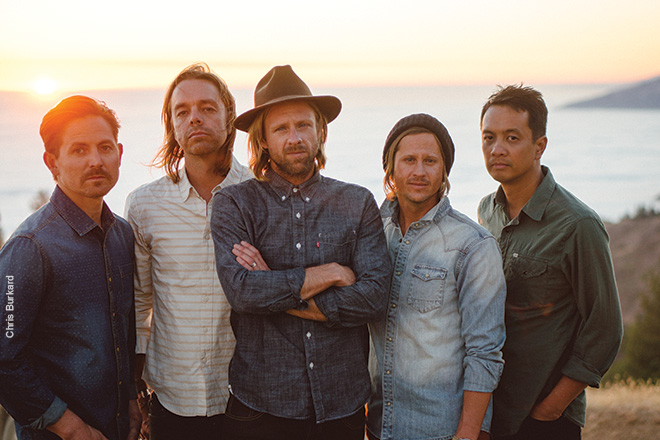SWITCHFOOT
The surfing rockers travel the world in search of waves—and inspiration
After 17 years and seven studio records, Grammy-winning Switchfoot looked to shake things up for their new album, Fading West. The longtime surfers—the band’s name is a surfing term—traveled to exotic global destinations to ride waves and compose. “The concept was, ‘What if we went to these spots around the planet to find that place between danger and safety and the songs that would be written in those environments?’” says frontman Jon Foreman. “All the songs were born from the journey.” Along the way, Foreman and his bandmates—brother Tim Foreman, Jerome Fontamillas, Drew Shirley and Chad Butler—decided to film the experience.
What was the goal of the album?
To challenge ourselves with instrumentation. Drew—the other guitar player—and I had a rule: guitars only as a last resort. Nothing says America or California more than a Fender guitar. But when you’re in Bali or South Africa, it doesn’t seem to fit the landscape. How are you going to express yourself with another instrument? That was a great challenge: to find new ways of expressing melody.
Why is challenging yourselves vital?
At the end of every record we reassess. You make a record, tour behind it, travel around the globe, and return home. Then you ask, “How are you going to challenge yourself?” For us that question became even more apropos now that this is our eighth album. I’m continually looking for the good, the true and the beautiful, whether that’s in somebody else’s art form, a rock show, or out surfing. The best songs are those that feel like you didn’t write them at all—they just came to you.
How did the film project develop?
It’s funny because our manager watched the movie and was like, “You guys just wanted to go surfing, and then you said, ‘Let’s make a movie’ and talked everyone into it.” You can see the songs being written in the film. A great example of that is in South Africa where we got to hang out with a children’s choir. These kids have the darkest struggle with AIDS and other issues, yet they have this incredible, unassailable hope and joy. That was probably more inspiring than any waves we would come across. You can see that song taking form in the film we’re calling The World You Want.
This is your third album working with producer Neal Avron.
Neal’s a great musician who’s excited about finding your vision rather than imposing his own vision on you. The other thing is the sonic landscape he brings as an engineer. When you’re in the studio, to know the palette is that wide is reassuring.
You and Tim also co-produced.
Yeah, and sometimes there’s definitely arguing. I used to think that was a failure, but now I feel you argue about the things you love passionately. Through the years, the biggest hurdle is trying to leave ego aside and figure out what’s best for the song. That becomes more important than whose idea it was.
Any moments that tested your resolve?
Oh man, so many. Every blessing is a curse, and the curse of having your own studio is letting things go. It’s impossible because you have the ability to go back and re-record. The danger is you could lose the magic. You could take something that’s magic, beautiful and human, and turn it into something impeccable that loses the humanity.
–Steve Rosen




comment closed